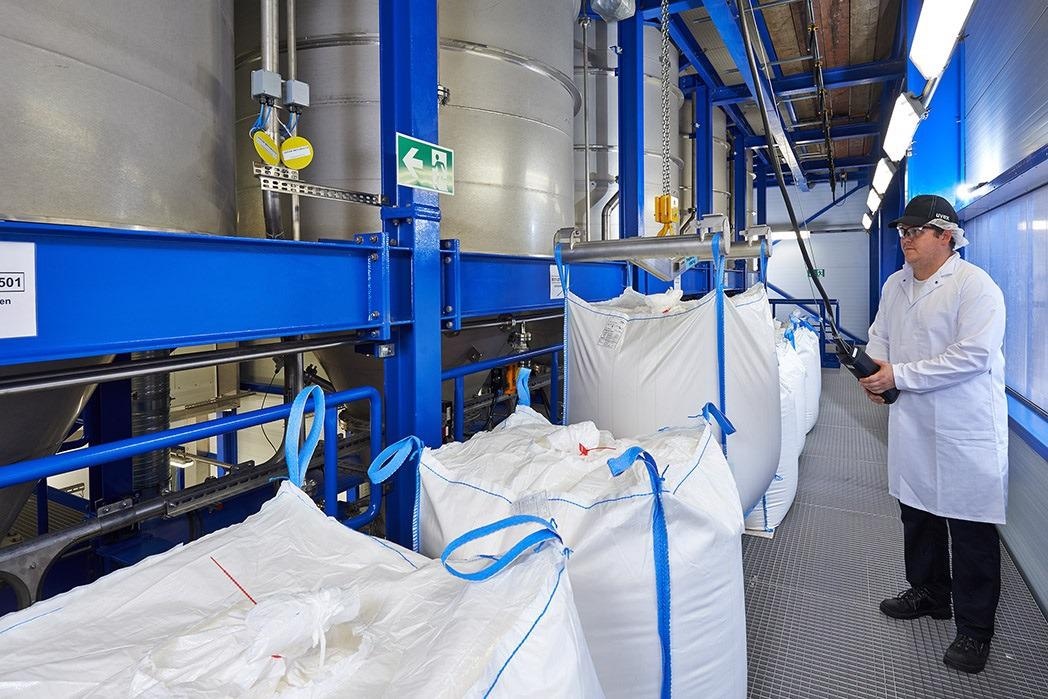Specialty chemicals company LANXESS will be at Aquatech in Amsterdam, Netherlands, from November 2 to 5, 2021, to present its comprehensive range of products for cleaning, processing and treating water. Ion exchange resins have become indispensable in applications such as producing ultra-pure water for the semiconductor industry or selectively removing pollutants, both in wastewater treatment and in the purification of drinking water.
 Filling ion exchange resins in a production facility at LANXESS's Leverkusen site. Image Credit: LANXESS AG
Filling ion exchange resins in a production facility at LANXESS's Leverkusen site. Image Credit: LANXESS AG
As Bettina Blottko, Head of the Liquid Purification Technologies business unit at LANXESS, explains, "Ion exchange resins and iron oxide adsorbers have been opening doors to new applications for decades thanks to their incredible and often tailor-made capabilities. This success story is not even close to finishing. I'm absolutely certain that we will be able to keep on developing promising solutions to all kinds of challenges for a long time to come."
With its extensive Lewatit range, LANXESS can look back on more than 80 years of experience in developing, manufacturing and deploying ion exchange resins. These are used to great effect in numerous industries for treating and purifying water and other liquids.
Treating Water Containing PFAS
There is currently a focus on problems such as the widespread contamination of water around the world with an array of per- and polyfluoroalkyl substances (PFAS), which are found in products such as fire-extinguishing foams and impregnation agents for textiles and paper as well as lubricants. All of them contain carbon-fluorine bonds. These are some of the strongest bonds in organic chemistry. Consequently, the substances are virtually non-biodegradable – an advantage when they are in use, but quite the opposite if they make their way into the environment. Compounds in this class namely accumulate in the bodies of living organisms once ingested. Their durability means that even traces must be removed from wastewater and that contaminated groundwater must be cleaned up. This involves adhering to national and regional limits measured in parts per thousand (ppt), some of which are extremely low.
Lewatit TP 108 DW anion exchange resins are particularly good at this. They can be relied upon to bind even traces of PFAS right down to the ppt range. Because of this and thanks to their greater effective absorption capacity of up to 100 g/l – even in the presence of chlorides and sulfates – this process is far superior to conventional filtration using activated carbon. Their service lives can be as much as five times longer than those of activated carbon filters.
A set of mobile systems that have been in operation for several years at fire department training grounds at Australian airports has confirmed these expectations. More than 54 million liters of water have been treated there since August 2019, with amounts as small as 200 ppb of PFAS removed as a result. The water has subsequently been fed back into the surface water in compliance with Australian drinking water regulations. Even when the resin was used only once without regeneration, it led to a cost advantage of almost 60 percent compared with activated carbon filtration. Lewatit TP 108 DW meets the requirements of the NSF/ANSI/CAN 61 standard for drinking water systems and has been certified by the US Water Quality Association (WQA).
Ion exchange resins can be used to remove higher concentrations of PFAS as well. This can be achieved, for example, in a two-stage process using the regenerable, weakly basic Lewatit MP 62 WS in combination with the strongly basic Lewatit K 6362 for subsequent final polishing.
LewaPlus – the Key to Superior System Configurations
LewaPlus, the combined calculation and design software application, makes it possible to plan ion exchange, reverse osmosis and ultrafiltration systems in the various system configurations available with Lewatit product technology.
In contrast to all other software solutions on the market, LewaPlus allows not only sequential handling of material flows but also the design of complex treatment systems using a wide range of technologies.
Synthetic Iron Oxide Adsorbers for Oxyanions
Products in the Bayoxide E range are designed for purifying groundwater and well water in a simple pump-and-treat system. They are based on high-quality synthetic iron oxide and enable arsenic oxyanions to be removed from water selectively and efficiently. They also bind phosphate and silicate, and the product can be used for water treatment in freshwater and saltwater aquaria, for example.
You can find more detailed information about products from this business unit on the website at: www.lewatit.com.